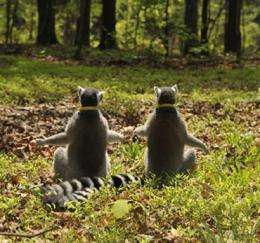Sir Richard's possible folly

Moving animals, like the ring-tailed lemur, from one continent to another to save the species hasn't been done often and typically isn’t successful.
But that hasn't deterred businessman and adventure tycoon Sir Richard Branson from announcing plans to import 30 ring-tailed lemurs from global zoos to his private island of Moskito, located in the Caribbean.
Branson's island lies 8,000 miles from lemurs' native home of Madagascar, where the animals have experienced more than 60 million years of independent evolution. Madagascar was great for them for most of that time, but lately lemurs are facing habitat decimation by human-induced logging, mining and political chaos.
These pressures are causing lemurs to disappear so quickly that they have become emblematic of the world's accelerating biodiversity crisis, says Anne Yoder, director of Duke University's Lemur Center, the world's largest facility for the conservation and study of these prosimian (non-ape or monkey) primates.
Yoder says that Branson's scheme to move ring-tailed lemurs, and possibly other types, to Moskito is "well intentioned," but, the plan is also " alarmingly misguided," specifically in terms of the lemurs' health and prospects for survival.
"We fear that if lemurs are released into Caribbean island habitats without proper oversight, they will perish," she says.
Yoder, along with other past and present Duke Lemur Center scientists, has spent more than 30 years monitoring lemur health and adaptation to exotic habitats, namely the center's free-range, 80-acre facility in a North Carolina forest. She says that though the lemurs can roam at the Durham-based center, each animal is examined each day to prevent and treat illnesses and to ensure survival.
While she and other lemur experts realize that "desperate times call for desperate measures," Yoder says Branson and others eager to help the lemurs should not ignore ways to protect and replenish the animal's native habitats in Madagascar.
Working with Malagasy partners and global experts in lemur conservation "is the best and only sustainable solution for assuring the survival of lemurs. We urge Sir Richard to reach out to such partners," Yoder says.
Provided by Duke University


















